Just like everyone else, individuals living with dementia, such as Alzheimer’s, have a personal life story to share. They, too, have lived full active lives during which they discovered their talents and developed their skills. Yet, families often worry that the person they love is becoming lost inside the disease. Many don’t realize that the skills and talents their loved one developed years ago can often be reawakened with patience and support.
One of our guiding principles at Anthem Memory Care is our commitment to continue to build purpose and meaning into the daily lives of residents. We recognize the unique lives and personalities of each resident. And, as we learn more about each resident, we encourage them to continue to share their life stories, hobbies, skills and talents with fellow residents, staff and families.
And we are happy to report that there is to plenty to share! Here are a few of our favorites:
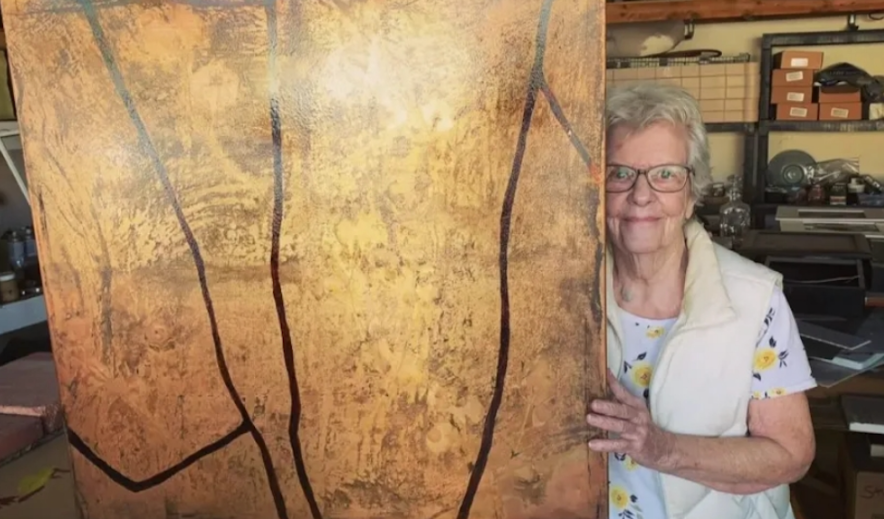
Gail Taylor, artist and resident of Vineyard Place Memory Care in Murrieta, California stands beside one of her amazing metal artwork depicting leaves on copper plates. Her work has been featured in books and has been displayed in hotels and hospitals all over the country.
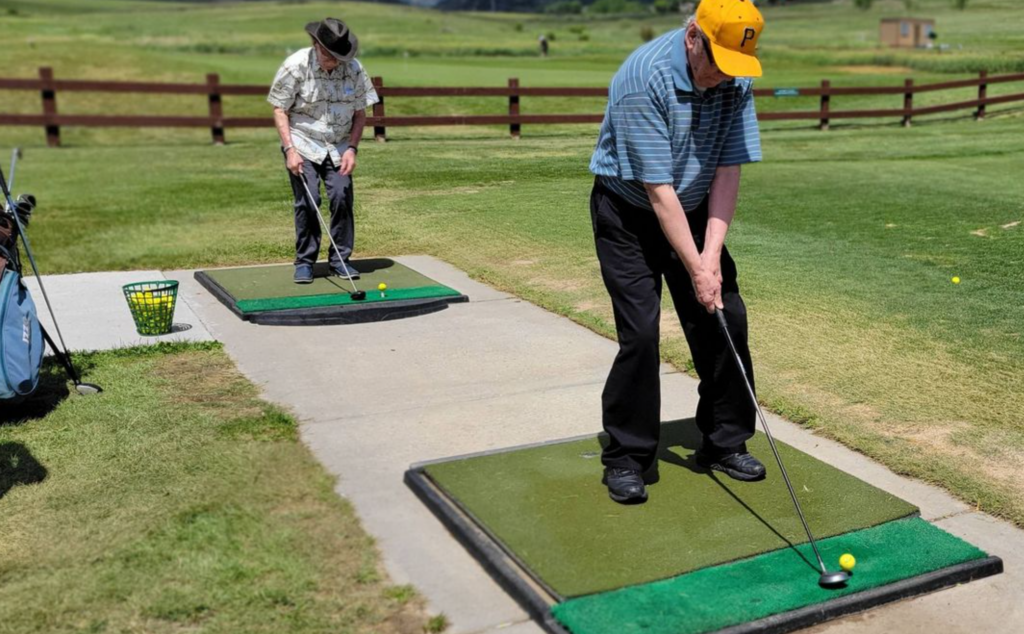
Many residents have enjoyed golf all their lives. Here, a few golfing residents of Willowbrook Place Memory Care in Littleton Colorado enjoy an outing on the driving range.
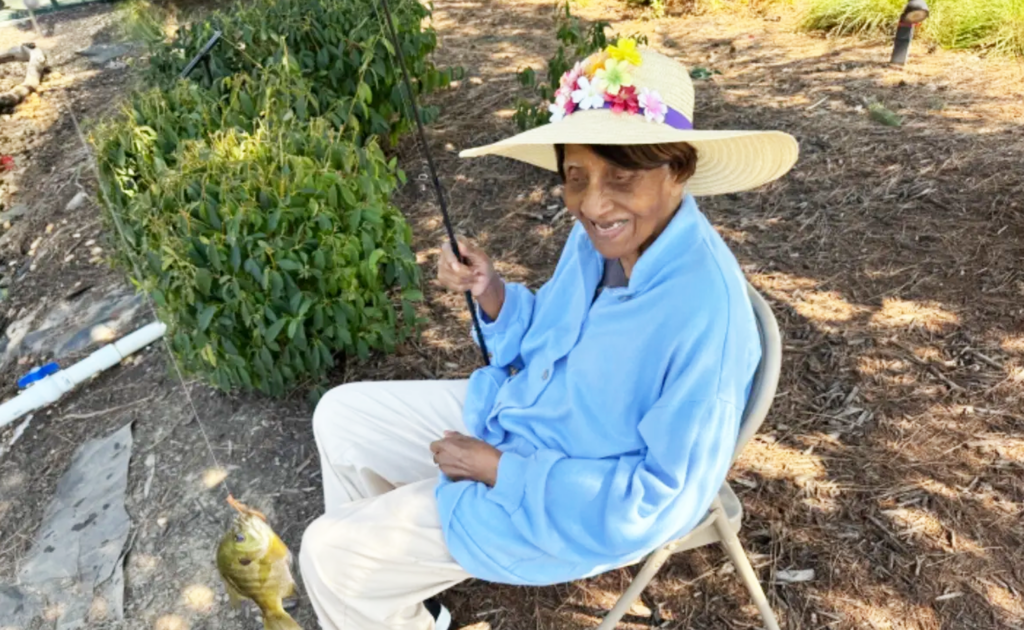
Lucille Noble, resident of Pinnacle Place Memory Care in Little Rock, Arkansas has fished all her life. Why stop now? Staff arranged for a visit to a local pond where Lucille happily cast her line out, bringing back memories, which she happily shared.
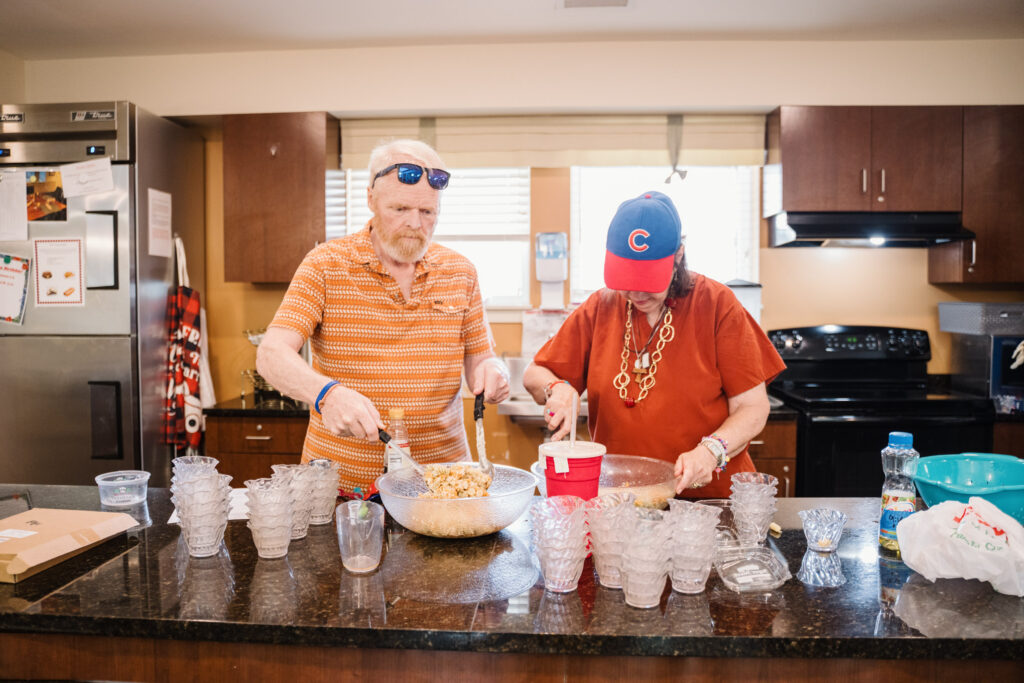
These residents of Harvester Place Memory Care in Burr Ridge, Illinois regularly take over the kitchen to show off their culinary skills honed through years of baking and cooking delicious meals for their families. Residents love it!
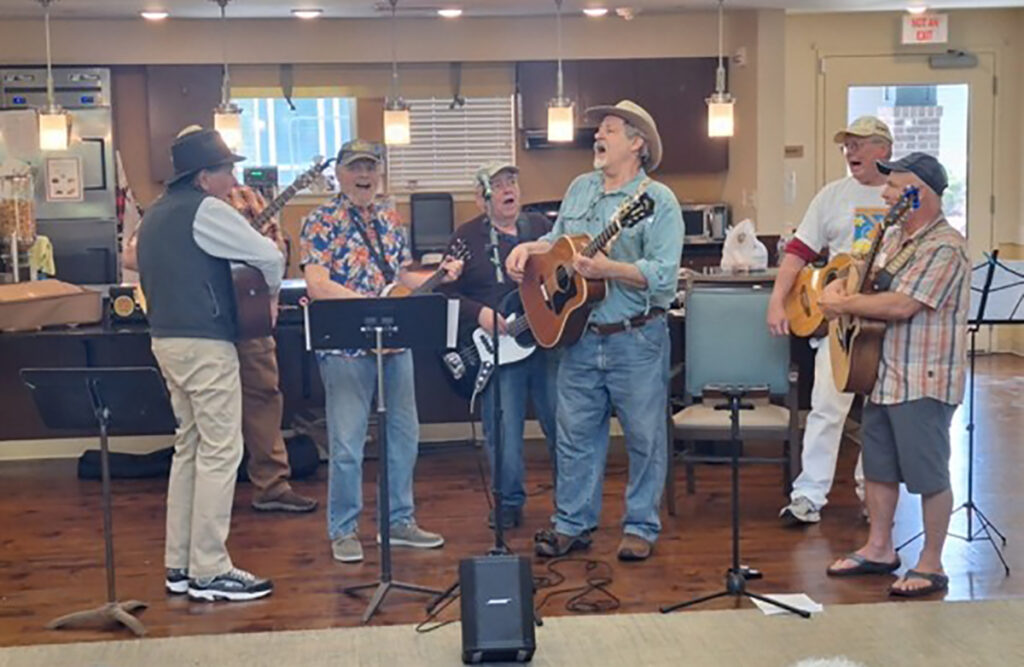
Another Harvester Place Memory Care resident, David Graham, reunites with his band, the Country Gentlemen, in Burr Ridge, Illinois to play some tunes for fellow residents and families.
At our Anthem Memory Care communities, we believe that it is so important for individuals with dementia to continue to enjoy as many of their hobbies and skills from their earlier lives as possible, and for as long as possible. We’ve seen firsthand the delight expressed by family members who discover that a loved one is sharing a story about their earlier years or a special talent with fellow residents.
If you are caring for someone with dementia, take some time to reminisce with them about some of their favorite hobbies or skills. Encourage them, to re-engage with them, if possible. Remaining connected to the things, people, and places that make their lives unique will give your loved one and your entire family many more positive moments and joy together.
(Our header image shows one of the many talented residents of Grace Point Place Memory Care in Oak Lawn, Illinois shows off her latest piece of art. Beautiful!)
Residents of Cascade Creek Memory Care in Rochester, Minnesota are doing something very important to them and their community: giving back! They are using their talents and skills to create an array of bracelets which are going on sale as part of a fundraiser to help the victims of the recent Florida hurricanes. Their project was covered by local channel KIMT. You can read the full article here.
When a loved one is diagnosed with dementia, it signals the beginning of a journey full of many challenges. Family caregivers must now assume a new and unfamiliar role and it isn’t easy to make the transition. Even more challenging is the fact that their loved one will eventually get to a point when they can no longer live alone, even with the support of family members and friends.
The question often on the minds of families is, “When should we consider a transition into memory care?” It’s a good question and a challenging one for families to answer without more information and insights from trusted sources.
As a memory care provider, we often speak with families who are in the early stages of reaching out for resources and more information about memory care and, more specifically, to better understand the warning signs they should look for that may indicate that the time for that transition has come.
Here are some signs that your loved one needs the professional support and safety of a memory care community:
It is also important to know that caring for a loved one with dementia can severely impact a family caregiver’s emotional wellbeing. Here are some warning signs to look for regarding your own mental health:
When is it time to plan for transitioning a loved one to memory care? The time is now.
There are many benefits to planning in advance. First, it gives families greater control over the process of researching and touring communities. It allows more time to get financials in order. And, It gives families time to consider the benefits of each community so that an informed decision can be made as to which is the best fit for their loved one. Finally, by making the decision in advance, it reduces stress levels on all family members.
A transition into memory care is an important stage of caring for a loved one with dementia. It places them in an environment tailored to meet their needs. It provides a safe haven, especially as an individual enters the middle stages of dementia. Memory care teams seek to help residents live purposeful lives with projects and activities that engage and connect them to each other and the world around them.
We invite you to reach out to any of our Anthem Memory Care communities with your questions and concerns. We will be happy to provide information and resources to guide you and your family in the journey ahead.
Residents and staff of Concord Place Memory Care in Knoxville, Tennessee are doing their part to help victims of the two recent hurricanes in Flordia. They are hosting a "sock drive", collecting dozens of new warm socks which will be taken to the East Tennessee chapter of the Red Cross. The drive goes through October 31st. You can learn more by contacting Concord Place.
Seniors helping seniors! Residents of Highline Place Memory Care paid a special visit to Pepper's Senior Dog Sanctuary. The residents gifted the elderly dogs beds, blankets, and toys and had a great time with their fellow seniors. CBS/Colorado covered the event. You can watch the full broadcast here.
As the holidays approach, many family caregivers have reached out to us to enroll their loved ones with dementia in our respite care program.
You may be wondering what respite care is. If so, you’re not alone. Many of those who are caring for a loved one with dementia in their home may not be aware that some memory care communities offer what is referred to as “respite care”, a short stay in a community for their loved one to give the caregiver some much needed time to take care of personal business and re-charge. It can be especially helpful over the holidays, as families are extra busy shopping and planning for family get togethers.
Our Anthem Memory Care communities offer respite care and families have told us how glad they were to have been able to use this service and the valuable time it gave them and their families. Many of the individuals with dementia liked what they experienced and have gone on to become full-time residents.
There are several benefits to registering your loved one with dementia into a respite care program.
Not all respite care programs are the same, however, so it is important to do some research on local communities and learn more about their programs, amenities, and philosophy. You can also learn is included for your loved one. Make it a point to visit a few care communities before you decide upon one. Ask questions. Dig into the details. Learn more about their care and programs. You need the assurance that your loved one will be in expert and loving hands.
Some tips for planning respite care for your loved one:
If you are like most family caregivers, you give your time freely and completely every day to support the needs of your loved one as well as other members of your family. That selflessness, while admirable, can take a toll on your mental and physical health. Respite care can reduce stress by providing the break you need to pay some attention to yourself. You deserve it.
Feel free to reach out to any of our Anthem Memory Care communities and ask about their respite care program. They’ll be happy to explain all the details and answer any questions you may have. We’re always here to help!
Many of our Anthem Memory Care residents and staff love fall because it brings cooler weather and the promise of holidays ahead. Fall ushers in a broad spectrum of opportunities for activities that are unique to the season.
Decorating our rooms and hallways with colorful leaf displays, visits to pumpkin patches, and planning Oktoberfest events are just some of the things we all look forward to. And, as our residents engage in these activities, we have found that they often spark memories relating to their own past experiences with their children and families.
In that spirit, we’d like to pass along some fall activity ideas that you can enjoy with all your family members, including loved ones living with dementia.
Our residents love all of these activities, but perhaps you can add to this list with special fall-themed traditions in your own family. Taking time to enjoy these activities benefits everyone in the family, young and old.
Don’t hesitate to contact any of our Anthem Memory Care communities for more ideas or to get information and caregiver resources. We welcome you to drop by and visit a community near you and learn more about our many activities and events tailored to bring purpose and meaning to the lives of our residents.
(Our header image shows a talented resident of Chisholm Place Memory Care in Wichita, Kansas showing off her beautiful fall wreath!)
Would you climb Mount Everest to support a good cause?
We know of two people who would, without hesitation, answer with a resounding “Yes”! Because they did it!
In August, Anthem’s co-principals, Isaac Scott and Lewis McCoy participated in the “Everesting Challenge”, a rigorous climb up Utah’s Mount Ogden from the Snowbasin base lodge to the peak. To achieve the ultimate goal, hikers make the vertical climb thirteen times over a 36-hour period. Isaac and Lewis were up to the challenge, with a total hiking distance of 29,029 vertical feet. And that is the equivalent height of Mt. Everest from sea level!
Climbing for a cause
However, for Scott and Lewis, the climb wasn’t just about personal gratification. It was to support a cause, one that we believe should be important to all operators of memory care communities. The Everesting Challenge climb was part of a program to raise awareness and funds for the Anthem Memory Care Employee Resource Fund.
This new program has been put together to support the needs of the very special individuals who provide daily loving care for our Anthem Memory Care residents. It will provide funding for employees who may need extra financial help from time to time as well as help ease the burden of paying for their own educational goals as well as things like school supplies for their own children.
Dedication to supporting our caregivers is central to our core values.
Our Anthem Memory Care mission is to “protect, engage, and love” our residents. That goes for our employees as well. At our Anthem communities we consider our caregivers as part of the Anthem family. But we also realize that they have families of their own, along with aspirations for their own personal and professional growth and that of those they love.
We are excited about the Employee Resource Fund and will continue to raise awareness as well as raise funds to support the program. You can learn more about the fund and other fundraising events by contacting any of our Anthem Memory Care communities.
Concord Place Memory Care recently celebrated a very special 100th birthday for resident, Gerald Lay. An Army veteran of World War II, Mr. Lay also enjoyed a successful career as a civil engineer.
He took time out of the celebration to share some words of wisdom: "Take things slow and enjoy life while you can.” Happy birthday, Gerald Lay! The event was covered by local TV Channel WVLT in Knoxville. You can watch the full video here.
According to data from the National Institute on Aging, one in four of individuals age 65 or older falls each year.
For seniors, especially those living alone, a fall seems to be always around the corner waiting to happen. It lurks in almost every corner of the home, as well as in the backyard and throughout the neighborhood. A fall can happen anywhere, and victims can end up with anything from a bruise or cut to a broken hip or even a life-threatening head injury.
Individuals with dementia are especially vulnerable to falls. That’s because it dementia causes a combination of cognitive and physical issues that make it more difficult for the individual to complete simple actions that they have done all their lives. That includes walking.
The culprit? Brain damage.
Individuals with dementia experience escalating damage to the motor and premotor cortex, the limbic system, and the basal ganglia of the brain. To coordinate brain signals from the brain to the muscles, all must work together. That is what enables an individual to do things like sit down, get up from a chair, turn around and walk. But when this complex network of signals and muscle response fails, even slightly, the result is often a fall.
Did you know that falls can differ depending on the type of dementia?
Many families don’t realize that the movements associated with a fall can differ depending on the type of dementia an individual has. It will also affect the nature and direction of the fall As an example, Alzheimer’s often involves a fall back into a chair when an individual attempts to get up. Individuals with Lewy Body disease or Parkinson’s dementia may experience a hard fall forward or backward resulting from a sudden stiffening of the body often accompanies by a loss of consciousness. The National Institute on Aging and the Itty Bitty Dementia Book by Dr. Tam Cummings explain in greater detail how the type of dementia may impact the fall.
The best way to handle a fall is to prevent one.
Here are some areas to focus on to help prevent your loved one from taking a bad fall:
Memory care communities work to reduce falls 24/7.
No one understands the link between dementia and the risk for falls better than professional caregivers in memory care communities. Safety must always be one of their top priorities and it is why so many families make the decision to transition their loved ones with dementia into memory care.
Our own staff at our Anthem Memory Care communities are trained to recognize the physical manifestations of each stage of dementia and recognize the triggers and warning signs of a fall. They work with residents to optimize their mobility and retain it for as long as possible. We incorporate a range of mobility aids as well as visual cues to help avoid confusion that could precede a fall. This includes strategically placed handrails, color coded pathways, signage, and flooring with non-glare coating.
While there is no guarantee that you can prevent a fall, you can improve the odds!
If you are caring for an aging loved one who is beginning to experience mobility issues, now is the time to arm yourself with information and gather the necessary tools to optimize their mobility and keep them safeguarded against activities and obstacles that can lead to a fall.
Feel free to contact an Anthem Memory Care community near you. We’ll be glad to answer your questions and share our resources with you. We’re here to help!
Residents of Chisholm Place recently crafted keychains, bracelets, and coasters as part of a fundraiser in honor of a local firefighter, Ty Voth, who was killed in the line of duty. The residents are committed to giving back and supporting their local community. Participating in charitable acts like these bring added purpose and meaning to their lives as well as those they are supporting through their efforts.
The funds raised were donated to the Wichita Firefighters Charitable Fund.
The fundraiser was covered by local Wichita station KAKE. You can watch the video here.
Once an artist, always an artist and no one knows this better than talented artist, Gail Taylor, resident of Vineyard Place Memory Care in Murrieta, California.
Taylor’s artwork has been featured in books and has been displayed in hotels and hospitals all over the country. Her signature works have depicted leaves cast in metals, such as copper. She accomplishes it by dipping the leaves in liquids and positioning them on copper plates. They are beautiful works of art and residents of Vineyard Place were excited to have some of these works displayed in their own exhibit.
The event was covered by the Press Enterprise. You can read the full article here.
Residents and local seniors competed for the crown at Greenridge Place Memory Care. Residents and staff had a blast creating scarves and hats for the show. Contestants performed and walked the runway to enthusiastic rounds of applause, until the final moment when former Mrs. Senior Colorado crowned the winners. It was a fun and engaging event for all who participated and attended!
The event was covered by local TV station, KDVR and you can watch the video here.
Lucille Noble, a 102-year-old resident of Pinnacle Place Memory Care in Little Rock, Arkansas, was taught to fish by her father as a child growing up in Thida, Arkansas. Pinnacle staff wanted to give her and Biff Morgan, another Pinnacle Place fishing aficionado, a chance to unleash their skills at the Bass Pro Shop pond. Guided by a Bass Pro expert, they had a blast telling stories about earlier days and enjoying the experience all over again.
The fishing expedition was covered in an article by local Little Rock Patch, which you can read here.
Families with loved ones diagnosed with Alzheimer’s disease are often left with more questions than answers. In many cases this is because their lives have been turned upside down by the news and they are struggling to gain control over their situation. It isn’t easy.
This is why it is critical for families to have access to solid information. They need answers to their immediate questions, a greater understanding of what is happening to their loved one, and tools to pave the way forward. Being armed with information will also help support decisions on how to handle their loved one’s needs, now and in the future.
It begins with an understanding of the stages of Alzheimer’s. And there are more than you think.
One area that often gets glossed over is a comprehensive description of the stages of Alzheimer’s. Most families have a vague understanding and often generally describe it as early, middle, and late stages of the disease.
In fact, there are seven stages of Alzheimer’s disease, as outlined by the Global Deterioration Scale. And each is important to understand. We have summarized them below:
Why is it important for everyone to understand all of the stages?
Understanding all seven stages of Alzheimer’s brings several benefits. First, it sheds light on the fact that many older individuals may already be in the early stages of dementia and yet have not been properly screened. Unfortunately, that is why most diagnoses aren’t made until an individual is already in stage 3, mild cognitive decline.
An early diagnosis brings more options, such as clinical trials and treatments which can delay the progression of dementia. Understanding the mid to later stages helps families better cope with the many cognitive, behavioral, and physical changes. It will help them tackle these challenges with open eyes as they present themselves. Finally, having a good understanding of the progression of the disease through later stages will help them plan for the future as their needs change.
If you are caring for a loved one and suspect that they may be in an early stage of dementia, encourage them to undergo testing. Medicare will pay for early screening and testing as well as many of the treatments available to slow the progression of dementia. But you must take action early to optimize those benefits.
The more you know, the better you can serve your loved one’s needs … and yours as well.
We encourage you to reach out to any of our Anthem Memory Care communities to learn more about Alzheimer’s and other dementias. Our experienced, caring team will be happy to sit down with you and answer your questions as well as provide you with additional information and resources.
A diagnosis of Alzheimer’s brings many challenges to families. Understanding each stage and being armed with accurate information will help you navigate the road ahead. And remember, we’re here to help!